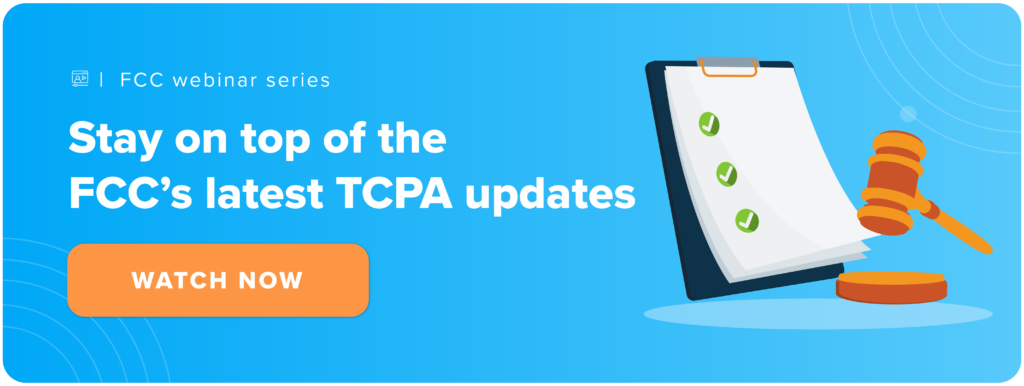How to manage TCPA third-party consent as a lead buyer

The Telephone Consumer Protection Act (TCPA) is a federal law enforced by the Federal Communications Commission (FCC) that governs telemarketing calls and text messages. It mandates that businesses secure prior express written consent from consumers before reaching out with marketing messages. For lead buyers, who often procure lists of leads from lead sellers, this can pose a significant challenge.
In this guide, we aim to clarify the potential legal consequences and risks associated with TCPA third-party consent for lead buyers, and to offer practical advice on mitigating litigation exposure.
Risks and legal implications for lead buyers when contacting purchased leads
When lead buyers reach out to purchased leads without ensuring they have the proper TCPA third-party consent, they expose themselves to a range of risks and legal consequences.
Fines
One of the most significant risks is the potential for hefty fines. The TCPA grants the FCC the authority to levy substantial monetary penalties, ranging from $500 to $1500 for each unsolicited call or text message. These fines can quickly add up, creating a financial burden and damaging the reputation of lead buyers, depending on the severity and frequency of the violations.
Lawsuits
Lead buyers who flout TCPA rules can also be sued by consumers who receive unwanted calls or texts, who can come together in multimillion dollar class actions. If a court finds that a lead buyer violated the TCPA, the damages can be steep. And the cost of defending a lawsuit – even if the lead buyer ultimately wins – can be significant.
Damaged reputation
Equally significant is the risk of harm to the brand’s reputation and the trust of its consumers. In today’s digital landscape, where privacy concerns are paramount, news of TCPA violations can quickly circulate, undermining the trust and confidence consumers place in a brand. This erosion of trust can have a direct impact on lead generation, as potential customers are less likely to engage with companies that are perceived to disregard their privacy.
In summary, overlooking the need for TCPA third-party consent can lead to a host of issues for lead buyers. To successfully navigate these complexities, lead buyers should take a proactive approach by understanding and following TCPA regulations, documenting consent carefully, and ensuring they obtain separate prior express written consent from consumers before making any telemarketing calls.

Understanding the FCC one-to-one consent rule
The FCC one-to-one consent rule is an update to the TCPA regulation by the FCC which pertains to telemarketing communications, particularly involving autodialed or prerecorded messages, and aims to ensure consumer privacy and prevent unwanted calls or messages.
Here are some of the key considerations around this rule.
Prior express written consent required
- Businesses must obtain prior express written consent from individuals before sending autodialed or prerecorded communications to their phones.
- This applies to both text messages and voice calls.
Clear opt-in consent
- The consent language and presentation must be specific and unambiguous.
- Consumers should affirmatively opt-in, either by signing a written agreement or checking a box on a digital form indicating agreement.
One-to-one relationship context
- Consent must be given in a one-to-one manner with the name of the brand performing the outreach or the consumer selecting from multiple brands.
- Messages must be “logically and topically” related to the context on the ad or webpage in which consent was provided. For example, a consumer giving consent on a car loan comparison shopping website does not provide consent to get texts or calls about loan consolidation.
Right to revoke consent
- Consumers have the right to revoke consent to be contacted at any time through any reasonable means, such as replying “STOP” (or other similar words) in a text message. Businesses must honor opt-out requests within 10 business days and are only allowed to send a one-time confirmation SMS to clarify the reason for the opt-out, provided it is sent within five minutes of the request and contains no promotional content.
Does a lead buyer need a separate express written consent?
Yes, a lead buyer (a business or individual purchasing leads for marketing purposes) needs a separate record of the express written consent provided by the consumer if they intend to contact the lead via autodialed or prerecorded messages, including text messages. Lead buyers cannot rely on the lead seller to gather consumer consent and provide the consent to the lead buyer if needed.
It’s wise to maintain thorough records of the consent obtained for each lead. This is crucial in case of disputes or inquiries.
Does express written consent transfer from a lead provider?
The transferability of express written consent from a lead provider to a lead buyer depends on the specific context, the nature of the consent given, and applicable laws and regulations. Here are key points to consider:
Nature of the consent
- Scope of consent: The original consent provided by the lead must explicitly allow for the sharing of their information with third parties, including lead buyers. If the consent is narrowly defined, it may not transfer.
- Transparency: The lead must be made aware, at the time of providing consent, that their information may be shared with or sold to the other parties.
Contractual agreements
- Agreements between the lead provider and lead buyer should clearly outline the conditions under which consent is transferred. A lack of clarity could expose both parties to legal risk.
Best practices
- Maintain documentation: Both the lead provider and buyer should keep detailed records of the consent, including the text used and the context in which it was obtained.
- Review and confirm consent: Lead buyers bear all of the legal and financial risks of non-compliant outreach, so they should establish a process to review and confirm the consent language and how it was presented to the consumer before contacting them.
Enforcement risks
- Violating consent requirements can result in legal consequences, such as fines, lawsuits, or damage to reputation. Both parties should ensure compliance with all applicable laws and review their practices regularly.
If you’re presenting prior express written consent language and onward transfers of consent transactions, consulting a legal professional familiar with relevant privacy and TCPA laws is strongly recommended.
Preventing litigation risk with TrustedForm Verify 1:1 Consent Check
To safeguard against potential TCPA litigation, lead buyers can employ TrustedForm Verify 1:1 Consent Check. This innovative feature allows lead buyers and advertisers to mitigate risk by confirming that your requirements for the disclosure language used to obtain prior express written consent are satisfied and digitally presented in a one-to-one manner to scale your auditing capabilities.
By utilizing this tool, lead buyers can ensure compliance with the FCC one-to-one consent requirements and significantly reduce the risk of penalties in a scalable way.

Conclusion
When you’re buying leads, it’s crucial to be in the know about the TCPA’s regulations on third-party consent. To steer clear of legal entanglements and maintain consumer confidence, only engage with lead providers who have transparent and verifiable records of their leads’ consent.
By sticking to these guidelines and teaming up with reputable lead sellers, you’re not only safeguarding against TCPA infractions but also upholding your business’s good standing and respecting the privacy of potential customers.
With the help of TrustedForm, lead buyers can easily and automatically document and retain proof of consumer consent, with evidence that consent was presented in a one-to-one manner to their specific brand.
Request a free demo now to see how TrustedForm works!


